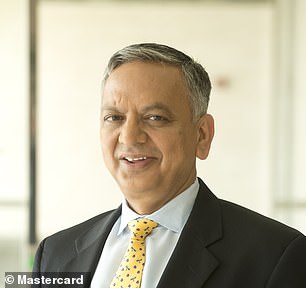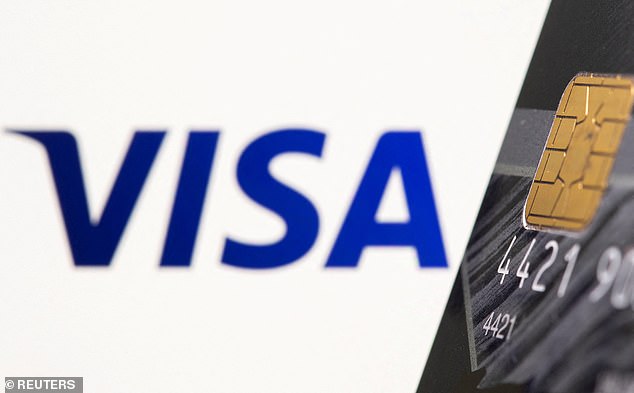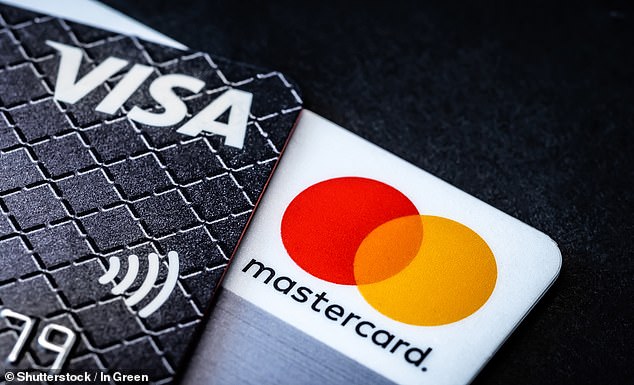When you think about generative AI and fraud, your mind may not immediately conjure up images of its use as a force for good.
Quite the opposite: criminals have been using new advances in artificial intelligence with great success to deceive their victims and take money from them. It allows them to create fake ads and scam websites faster than ever.
Recently, This is Money revealed how criminals are using AI to create realistic counterfeit tickets for events from football games to concerts.
But card network giants (and fierce rivals) Mastercard and Visa have recently revealed how they are using generative AI to beat criminals at their own game.
Mastercard and Visa are beating criminals at their own game by using AI to predict stolen card details
Mastercard says it has added artificial intelligence to its arsenal of predictive powers so it can quickly detect when criminals are using data from stolen credit and debit cards.
The use of AI in fraud detection is nothing new, as banks and the payments industry have been using it in different ways for the last 20 years.
But the use of generative AI in fraud detection is breaking new ground, according to Rohit Chauhan, vice president of AI at Mastercard.
He told This is Money that “generative AI is adding some magic to fraud detection.”
Every year, fraudsters steal millions of credit and debit card numbers using spyware, malware, and other underhanded practices like “card spinning.”
Card skimming occurs when card details are compromised when shopping online, either through malicious code on retailers’ websites or by misleading consumers with false advertising on social media sites.
Once criminals obtain your card details, they can use them to go shopping and even sell your card details to other criminals.

Rohit Chauhan, executive vice president of AI at Mastercard, says generative AI is adding some magic to fraud detection
Once they have collected thousands of card details, criminals will group them together and hide all but four 16-digit card numbers.
They will then advertise them on the dark web for other criminals to purchase.
This criminal activity falls under what UK Finance classifies as unauthorized fraud – when the cardholder does not provide authorization for a purchase and the transaction is carried out by a criminal.
Losses from unauthorized card fraud amounted to £551.3m in 2023, according to industry body UK Finance, and amounted to 2.7m cases.
But now Mastercard is trying to outwit criminals by predicting which cards are compromised online so it can block them before criminals can use them.
This is how they are doing it.
Mastercard scans millions of card numbers on its network and takes all the ones it identifies as having potentially suspicious activity, as well as all the four-digit ads for stolen cards it detects on the dark web.
Matching these numbers and filling in the gaps between the four-digit card ads and the full 16-digit card numbers is where generative AI comes into play.
Using its predictive powers, Mastercard can quickly find the full details of compromised cards.
Chauhan said: “It’s a bit like trying to complete a jigsaw puzzle when you only have four pieces and you don’t know what the pattern looks like.” Generative AI helps complete the puzzle by filling in the missing numbers.’
And he added: ‘With these compromised cards, the important thing is to detect them quickly and with great precision. “This way we can start to help banks understand which cards are compromised so they can take action.”
The new technology scans transaction data between cards and merchants Mastercard partners with at speeds faster than previously imaginable.
Mastercard said the new technology is capable of doubling the speed at which Mastercard can detect compromised cards and reducing the number of false positives when detecting fraudulent transactions against potentially compromised cards by up to 200 percent.
Generative AI will also help Mastercard speed up by 300 percent the identification of merchants who are at risk or already compromised by fraudsters.
As a result, Mastercard said it will be able to alert banks more quickly and more accurately when a card may be compromised.
The card can then be blocked for the customer and reissued.
It has not yet been implemented in all banks. With the new generative AI tool, Mastercard said it is providing a solution to UK banks, but it is up to the banks to implement it.
Mastercard said banks could use the technology to monitor transaction attempts with the compromised card to mitigate fraud and improve cybersecurity.
Johan Gerber, executive vice president of cyber security and innovation at Mastercard, said: “Until now, fraudsters may have thought they were operating in the dark, seeking to launder the card data of millions of unsuspecting victims.”
“Thanks to our world-leading cyber technology, we can now put the puzzle together and improve trust towards banks, their customers and the digital ecosystem as a whole.”
Chauhan added: “It is not a silver bullet, nothing will stop fraud in its tracks.” But this is a great example of how we are innovating to stay ahead of the scammers.”

Visa launched Visa Protect, which uses artificial intelligence to scan billions of historical transactions and identify compromised cards.
How Visa Protect fights fraud
Mastercard rival Visa also recently announced that it is using new artificial intelligence technology to combat fraud in partnership with Pay.UK.
It has been using AI to analyze billions of historical banking transactions for signs of fraudulent activity. He successfully identified 54 percent of the fraudulent transactions in addition to those already identified by the banks.
Called Visa Protect, Visa Protect says this could save the UK more than £330 million a year from authorized push payment (APP) fraud and scams.
In a pilot with Pay UK, Visa analyzed billions of card transactions over the past 12 months using AI.
Visa is now making its AI technology available to all UK banks.
Visa says the new technology will help intercept suspected fraudulent transactions in real time, stopping scams before the money leaves the victim’s bank account.
It has the potential to recover £330 million from the hands of criminals out of £600 million lost annually to scams and account-to-account fraud in recent years in the UK, according to UK Finance.
Mandy Lamb, CEO of Visa UK and Ireland, said: “The UK has one of the most developed payment systems in the world, but also has some of the highest levels of account-to-account fraud.
“We are now bringing our AI capabilities to bear on account-to-account payment fraud and scams before they happen.”
Some links in this article may be affiliate links. If you click on them, we may earn a small commission. That helps us fund This Is Money and keep it free to use. We do not write articles to promote products. We do not allow any commercial relationship to affect our editorial independence.



